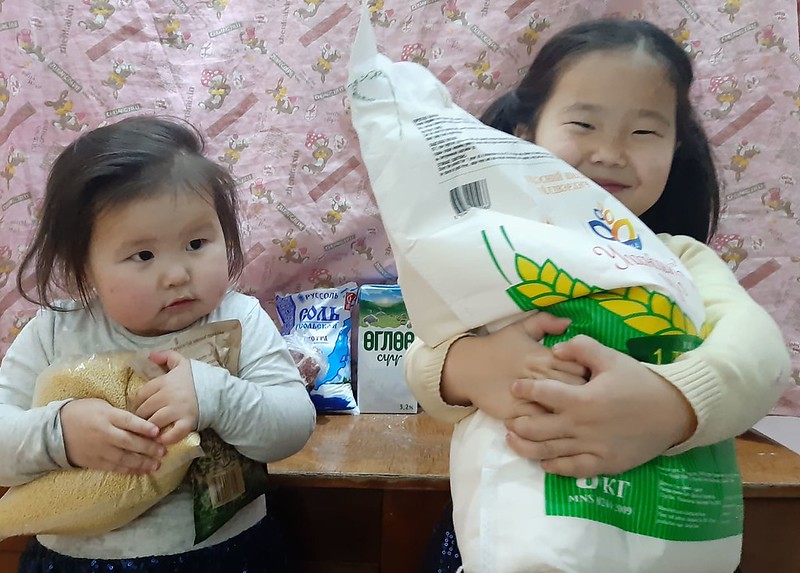BGR’s ongoing partnership with Maitreya Charity in Mongolia provides hot meals and educational support to children in need through the Asral Hot Meal Project, one of 54 projects approved for the coming fiscal year.
By BGR Staff
This spring, BGR’s Board approved 54 projects serving thousands of people around the world. The project funding for BGR’s fiscal year 2022–23 amounted to $1,089,574.
During the weekend of April 30 and May 1, 2022, the Buddhist Global Relief Board and staff reviewed and approved 54 project proposals from partners in 20 countries around the world for our 2022-23 fiscal year, which runs from July 1, 2022 through June 30, 2023. The approved projects will relieve hunger, educate children, provide vocational opportunities and training for vulnerable women, and support sustainable agriculture among smallholder farmers. The projects will take place in Afghanistan, Bangladesh, Brazil, Cambodia, Cameroon, Côte d’Ivoire, Ethiopia, Haiti, Kenya, Malawi, Mongolia, Myanmar, Nicaragua, Peru, Senegal, Sri Lanka, Tanzania, Uganda, Vietnam, and here in the United States.
Once again this year we were joined for part of the meeting by Board members from BGR’s European sister organization, Mitgefühl in Aktion (MiA), which is cosponsoring seven projects with us. These include sponsorship for the families of backpack medics in Myanmar; a girls’ home and community center in India; and a vocational training program for widows and single mothers in Cameroon.
The total spending to be allocated to grants comes to $1,089,574, which includes a contribution from MiA of $42,000, distributed equally over the seven cosponsored projects.
A majority of BGR’s projects are renewable year to year as our trusted partners continue to demonstrate the responsiveness and effectiveness of their work over time. This year, the Board approved three new projects, all from existing BGR partners.
In Sri Lanka, a project with our partner Shraddha Charity Organization will address an epidemic of chronic kidney disease among Sri Lankan paddy farmers. In the last two decades, more than 23,000 deaths have been reported from this virulent disease caused by water contaminated by agrochemicals. The majority of victims are middle-aged men who are the breadwinners for their families, and their passing devastates their family’s livelihood and food security as well as their children’s education. This new project will construct sources of safe water, including deep wells and state-of-the-art water-purification systems, in areas affected by contaminated water in the communities of Kandaketiya and Dakunamahatennagama in Sri Lanka. The project will also raise community awareness of the dangers of water contamination and educate the public about the risks of agrochemical use in farming practices. The project will directly benefit 2,173 people, half of them women and girls; an additional 1,000 people in these communities will benefit from access to new sources of clean drinking water.
A second new project with Shraddha Charity Organization will provide nutritious breakfasts for undernourished schoolchildren in Sri Lanka’s North Eastern Province, where rates of malnutrition are high due to widespread poverty and thousands of children arrive at school hungry each day. This new project will provide 166 poor schoolchildren, half of them girls, with a nutritious breakfast daily for the duration of the 2022–23 school year. The meals will give the children much-needed nutrients and energy to focus on their studies, offering them a path out of generational poverty.
In Cameroon, where Covid has amplified the ill effects of the ongoing civil war known as the Anglophone Crisis, it is estimated that more than a million people are living as IDPs (internally displaced persons), separated from their home communities and without access to their land, livestock, and other means of livelihood production and survival. In the villages of Bulu and Bokwaongo in southwest Cameroon, an influx of IDPs has led to food scarcity, increased food prices, and widespread hunger. To address this issue, long-term BGR partner CENCUDER is introducing an organic vegetable gardening project serving IDPs and others who are experiencing food insecurity. These include widows, single mothers, and young people whose families cannot afford to send them to school. The project will provide training and materials for the cultivation of huckleberry, tomato, eggplant, okra, amaranth, and other small-scale crops. Our partner’s aim is to support participants in harvesting sufficient crops both to feed themselves and their families and to sell on the market, enabling them to earn income for education and other fundamental household needs. The project will benefit 160 people, including 100 women.
To meet the additional stress that inflation is causing for our partners who are initiating direct food assistance projects, the BGR Board decided to provide each of these partners an additional 10 percent supplement to the grant. Thus, for example, if a grant was originally designated for $10,000 to a particular partner, the grant will be increased to $11,000.
We are deeply grateful to all our donors whose donations have contributed to our success, and to all the volunteers who devote time and energy to easing the burden of work on our Board and staff.
May the fruits of our work together be a light in the world, a source of ease, hope, and nourishment for those whom we serve.





